The best fast VPS hosting providers offer high-speed server response times, powerful hardware, and reliable performance for demanding workloads. The top recommended fast VPS hosting provider is Hostinger. Their VPS plans deliver exceptional speed through KVM-based virtualization, AMD EPYC processors, and NVMe SSD storage.
Fast VPS hosting refers to VPS hosting that provides server response times of 180 milliseconds (ms) or lower. VPS hosting is a type of hosting that uses virtualization technology to create isolated environments within a single physical server. This ensures dedicated resources and supports optimal performance.
This article also includes the fastest cloud hosting providers due to their similarities with fast VPS hosting. Both rely on virtualization, but cloud hosting scales resources across multiple physical servers and therefore offers additional flexibility. Start by choosing a fast VPS host if your traffic is steady and you need predictable costs. Switch to fast cloud hosting when these VPS resources become insufficient to handle unexpected traffic spikes.
A fast VPS hosting provider achieves speed with top-tier processors like Intel Xeon or AMD EPYC, NVMe SSD storage, and high outbound bandwidth (300 Mb/s–1 Gb/s). 3 reasons for performance slowdowns in this type of hosting are resource overutilization, hardware failure, and the scalability limits of a single physical server. There are 3 ways to speed up fast VPS hosting. The first is vertical scaling by upgrading resources. The second is to optimize settings via root access. The third is to pick a data center that is nearer your audience. KVM (Kernel-based virtual machines) virtualization ensures stability by preventing resource contention from other users. Fast VPS hosting is compatible with both the Linux and Windows operating systems.
Fastest VPS Hosting
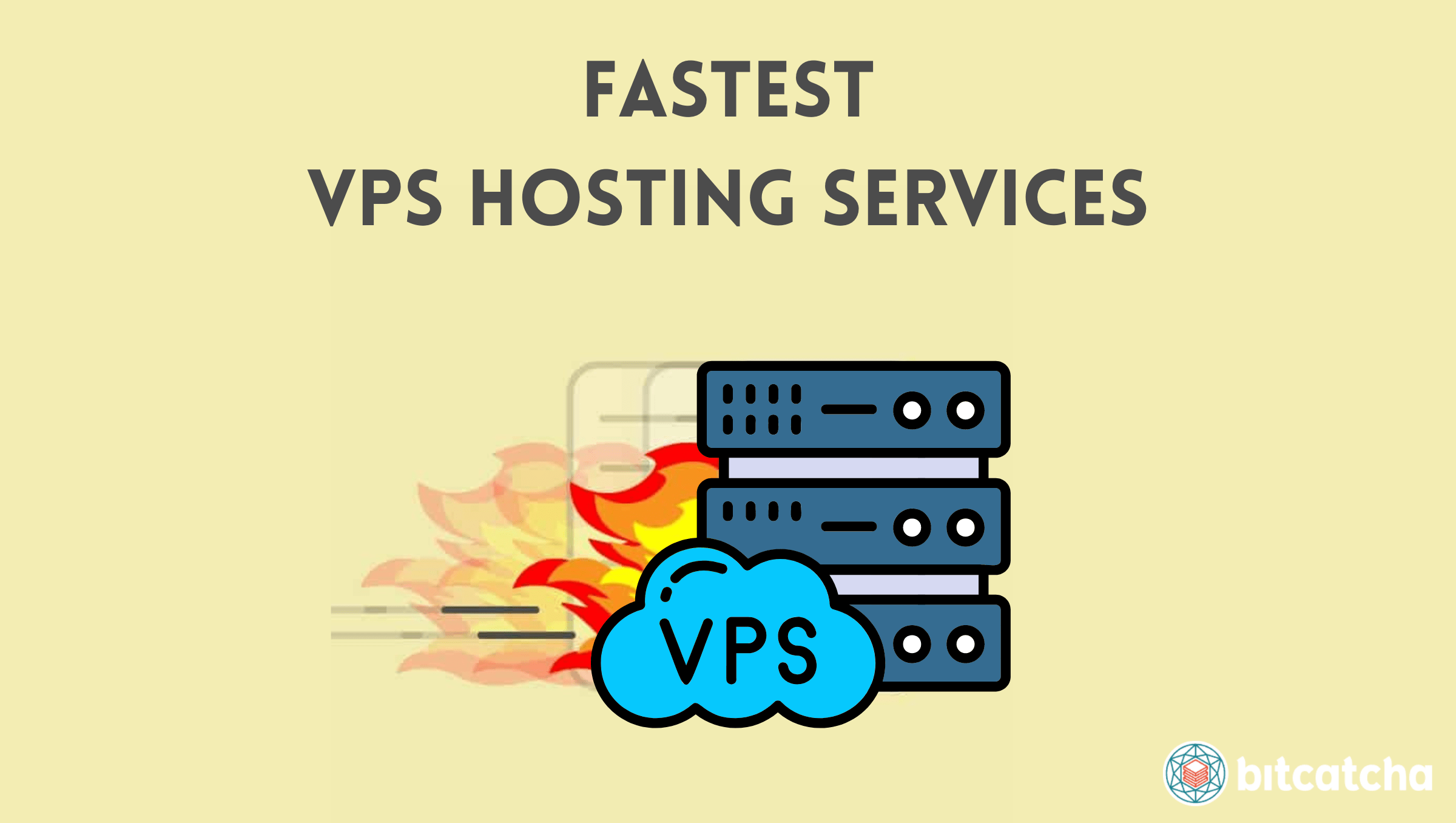
Top Fastest VPS Hosting Services

1. Hostinger
https://www.hostinger.com/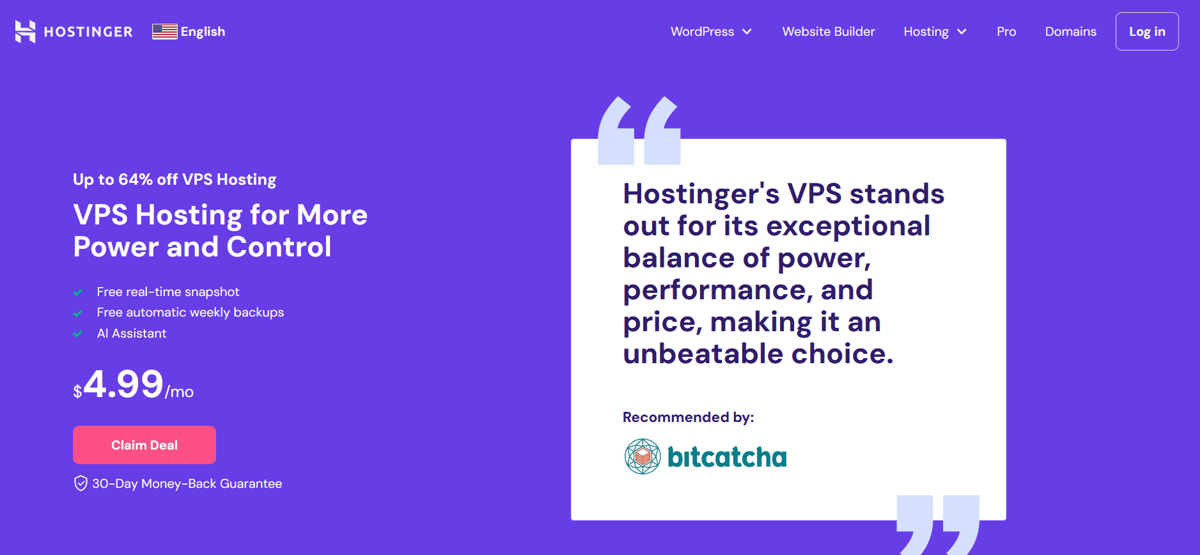
Hostinger provides fast VPS hosting by leveraging KVM (Kernel-based Virtual Machines) technology. They offer the KVM 2 plan at an affordable $7.99 per month. This plan includes 2 vCPU cores and 8 GB RAM. 100 GB of NVMe SSD storage ensures faster data access and improved server responsiveness. The package also comes with a substantial 2 TB bandwidth. AMD EPYC processors guarantee superior processing power, while a 300 Mb/s network enhances connectivity speed. Users also get root access for full server control. Check our Hostinger review for more details.
What are the pros and cons of Hostinger’s fast VPS?
Pros
- Root access provided
- Free domain name included
- Unlimited free SSL
- 9 data center locations worldwide
- 99.9% uptime guarantee
- 30 day money back guarantee
Cons
- Free weekly backups only (not daily)
- Can’t load own OS

2. TMDHosting
https://www.tmdhosting.com/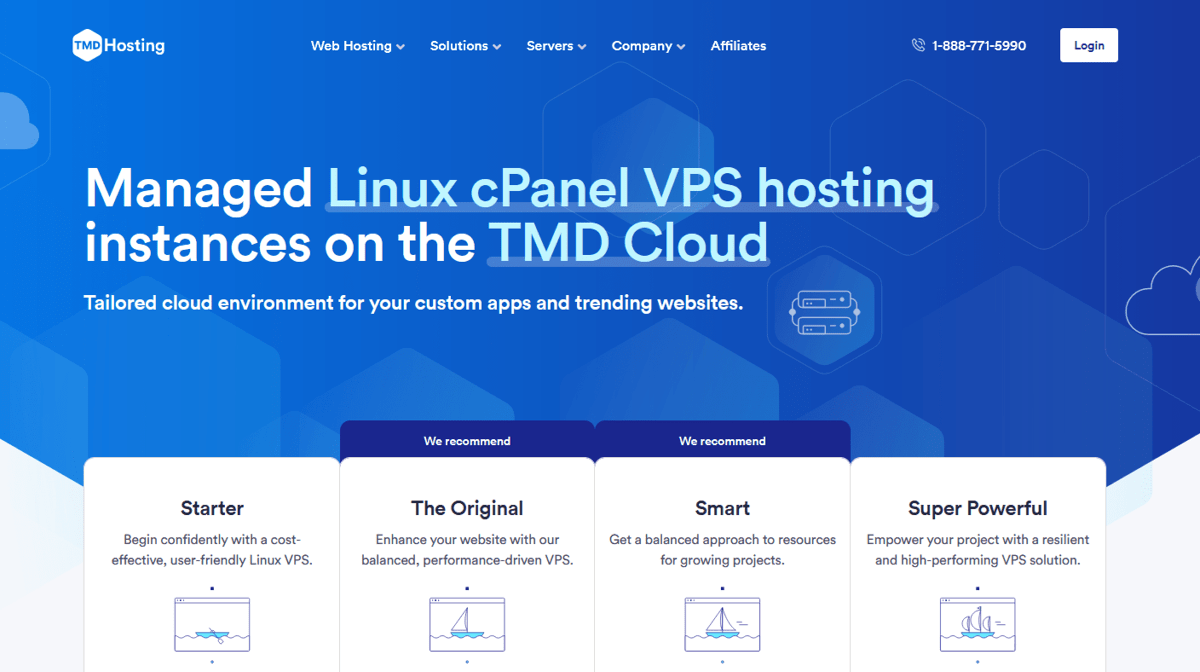
TMDHosting offers fast managed VPS hosting that operates on a fully N+1 redundant cloud server infrastructure. Their Starter VPS plan is priced at $24.99 per month. It comes with 2 vCPU cores, 60 GB SSD storage, and 2GB DDR4 RAM for optimized server speeds. The plan also includes 2 TB bandwidth for robust data transfer capabilities. A free CDN and premium caching speed things up further. Check our TMDHosting review for more details.
What are the pros and cons of TMDHosting’s fast VPS?
Pros
- Free daily backups
- Free SSL certificate
- 6 data center locations worldwide
- 30-day money back guarantee
- Free domain
- Linux and Windows options
Cons
- No root access
- Can’t load own OS

3. UltaHost
https://ultahost.com
UltaHost offers high-performance VPS hosting starting at $4.80 per month. Their VPS Basic plan includes 1 CPU core, 1 GB DDR5 RAM, 30 GB NVMe SSD storage, and unmetered bandwidth for reliable speed. Users benefit from low latency and consistent performance with their global network of data centers.
Their managed VPS plans support both Linux and Windows and provide control panel options like cPanel, Plesk, or CyberPanel. Advanced security features include free DDoS protection, daily backups, and a free SSL certificate. Full root access and 24/7 support ensure control and assistance when needed. Check our UltaHost review for more details.
What are the pros and cons of UltaHost’s fast VPS?
Pros
- Affordable pricing with unmetered bandwidth
- NVMe SSD storage for fast data access
- 20+ global data centers for low latency
- Managed VPS with free DDoS protection and daily backups
- Linux and Windows support
- Full root access
Cons
- Free domain only with annual plans
- No free email hosting

4. GreenGeeks
https://www.greengeeks.com/
GreenGeeks offers eco-friendly VPS hosting that utilizes the latest Intel Xeon processors for optimized speed performance. Their MVM-2GB plan is priced at $39.95 per month. It includes 4 vCPU cores, 2 GB RAM, and 50 GB of RAID-10 SSD storage. Users also get a generous 10 TB bandwidth and root access in this plan. They’re also put 300% of their energy consumption back into the grid. Check our GreenGeeks review for more details.
What are the pros and cons of GreenGeeks’ fast VPS?
Pros
- Root access provided
- Free backups via WHM
- Free SSL included
- 4 data center locations worldwide
- 99.9% uptime guarantee
- 30 day money back guarantee
Cons
- No free domain name provided
- Can’t load own OS

5. ScalaHosting
https://www.scalahosting.com/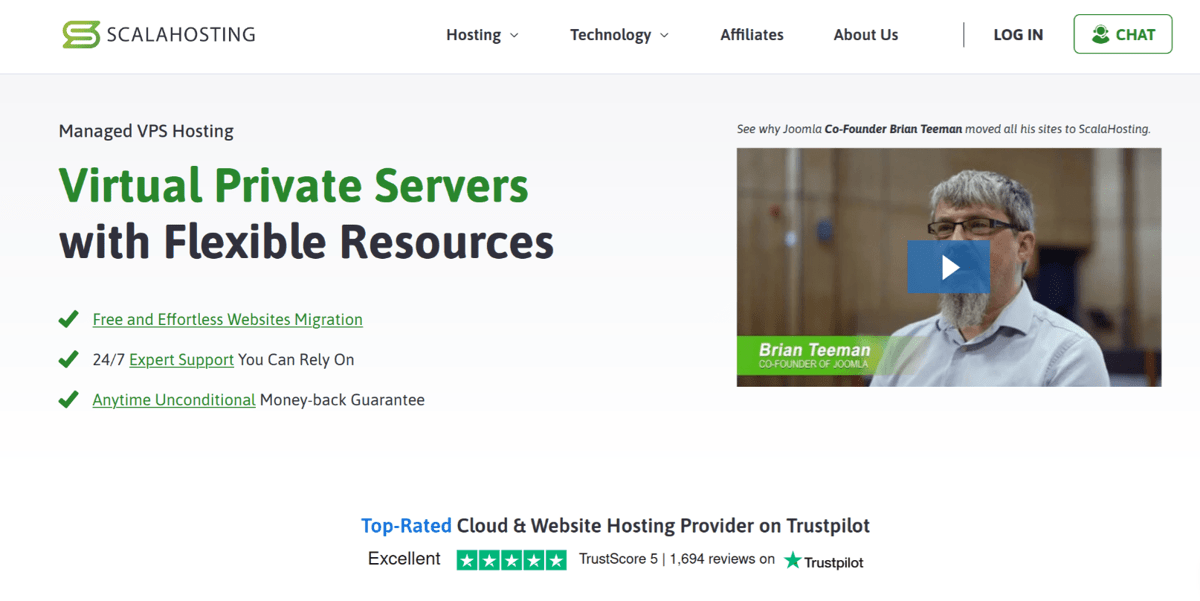
ScalaHosting offers fast and scalable KVM-based VPS plans suitable for websites of all sizes. Their Build #1 plan is available at $29.95 per month. It includes 2 vCPU cores, 4 GB RAM, and 50 GB NVMe SSD storage. Other perks include unmetered bandwidth and full root access. Check our ScalaHosting review for more details.
What are the pros and cons of ScalaHosting’s fast VPS?
Pros
- Root access provided
- Free daily backups (offsite)
- Free SSL included
- 3 data center locations worldwide
- 99.9% uptime guarantee
- Anytime money back guarantee
Cons
- 3 year subscription to get cheapest prices
- No free domain name provided
- Can’t load own OS

6. A2 Hosting
https://www.a2hosting.com/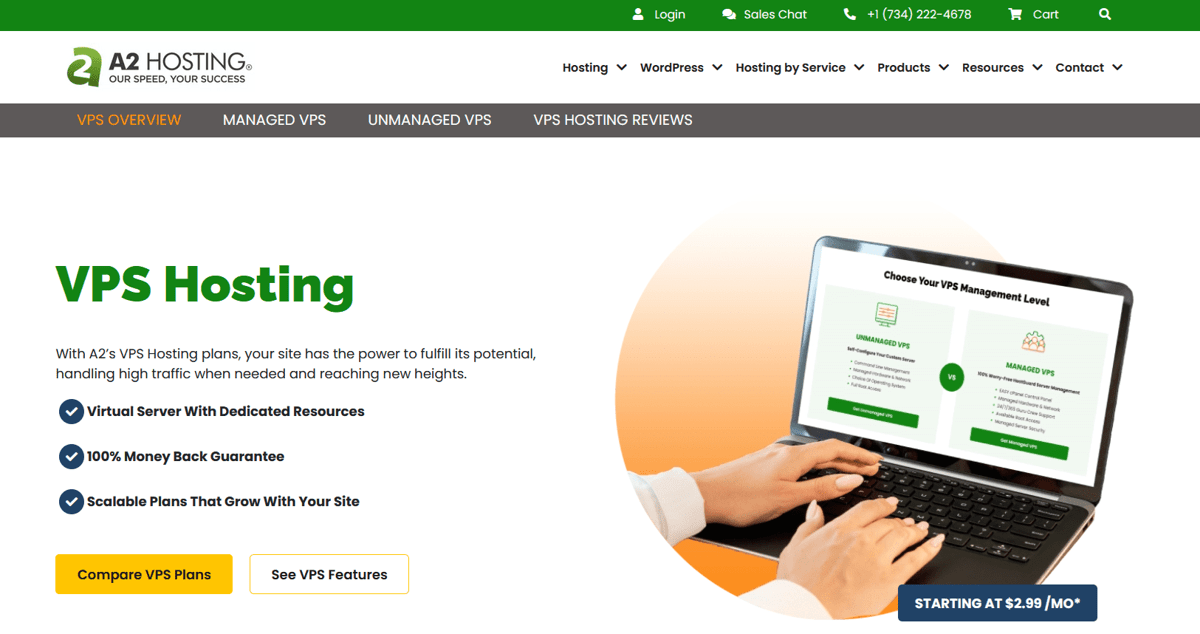
A2 Hosting offers powerful VPS hosting backed up by AMD EPYC processors. Their Supersonic 8 plan is priced at $24.99 per month. It includes 6 vCPU cores and 8 GB RAM to cater to a variety of demanding projects. It also features 200 GB of RAID-10 NVMe SSD storage for enhanced data integrity and speed. 4 TB bandwidth and root access provides ample data transfer capacity and full server control. Check our A2 Hosting review for more details.
What are the pros and cons of A2’s fast VPS?
Pros
- Root access provided
- Free SSL included
- 4 data center locations worldwide
- 99.9% uptime guarantee
- 30 day money back guarantee
Cons
- 3 year subscription to get cheapest prices
- No free backups provided
- No free domain name provided
- Can’t load own OS

7. DreamHost
https://www.dreamhost.com/
DreamHost offers VPS hosting services that utilize LXC (Linux Containers) and OPcache for enhanced performance. Their VPS Business plan is priced at $20 per month. It provides 1 vCPU core and 2 GB RAM for stable performance. The plan also includes 60 GB of storage and boasts unlimited bandwidth. These features ensure efficient resource management and faster loading times. Check our DreamHost review for more details.
What are the pros and cons of DreamHost’s fast VPS?
Pros
- Free domain name included
- Free SSL included
- Can load own OS
- 100% uptime guarantee
Cons
- 3 year subscription to get cheapest price
- No root access provided
- No free backups provided
- 2 data centers only (US based)
- No money back guarantee
Top Fastest Cloud Hosting Services

1. Hostinger
https://www.hostinger.com/
Hostinger’s cloud hosting is powered by CloudLinux with LVE containers to ensure isolated and dedicated resources for each user. Their Cloud Startup plan is priced at an affordable $8.99 per month. It features 2 vCPU cores, 3 GB RAM, and a generous 200 GB NVMe SSD storage. Unlimited bandwidth, HTTP/3 support, and a complimentary CDN enhances website speed and global reach. Check our Hostinger hosting review for more details.
What are the pros and cons of Hostinger’s fast cloud hosting?
Pros
- Free daily backups
- Free domain name provided
- Unlimited free SSL
- 9 data center locations worldwide
- 99.9% uptime guarantee
- 30 day money back guarantee
Cons
- 4 year subscription to get cheapest prices
- No root access provided
- Can’t load own OS

2. SiteGround
https://www.siteground.com/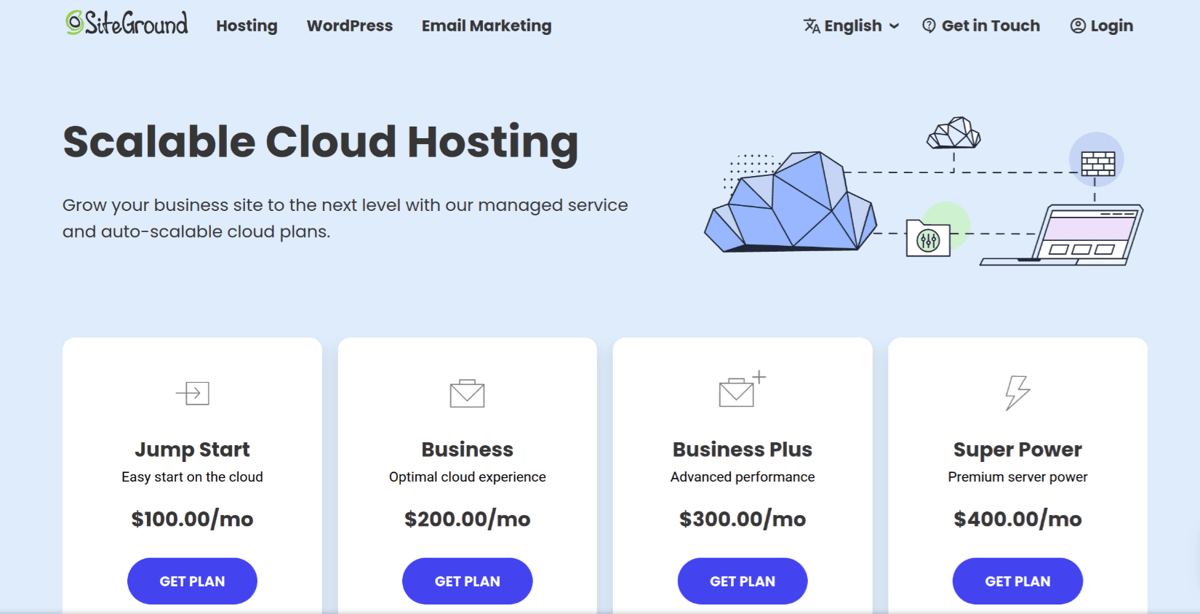
SiteGround offers high-performance cloud hosting enhanced with their proprietary SuperCacher technology. Their Jump Start plan is priced at $90 per month. It includes 4 vCPU cores, 8 GB RAM, and 40 GB SSD storage. Users also get a substantial 5 TB bandwidth and a free CDN for fast content delivery speeds worldwide. Check our SiteGround hosting review for more details.
What are the pros and cons of SiteGround’s fast cloud hosting?
Pros
- Free daily backups
- Free wildcard SSL included
- 11 data center locations worldwide
- 99.9% uptime guarantee
- 14 day money back guarantee
Cons
- No root access provided
- No free domain provided
- Can’t load own OS

3. Cloudways
https://www.cloudways.com/
Cloudways’ cloud hosting uses ThunderStack technology. This is a powerful combination of server and cache technologies for swift and efficient website performance. Their DO1 GB plan is available at $11 per month. This plan includes 1 vCPU core and 1 GB RAM. The plan also provides 25 GB SSD storage and a generous 1 TB bandwidth to accommodate substantial data transfer needs. Check our Cloudways hosting review for more details.
What are the pros and cons of Cloudways’ fast cloud hosting?
Pros
- Hourly and monthly billing options
- Automated free backups
- Free SSL included
- Over 65 data center locations worldwide
- At least 99.9% uptime guarantee
- 3 day free trial (credit card not required)
Cons
- No root access provided
- No free domain name provided
- Can’t load own OS
- No money back guarantee

4. IONOS
https://www.ionos.com/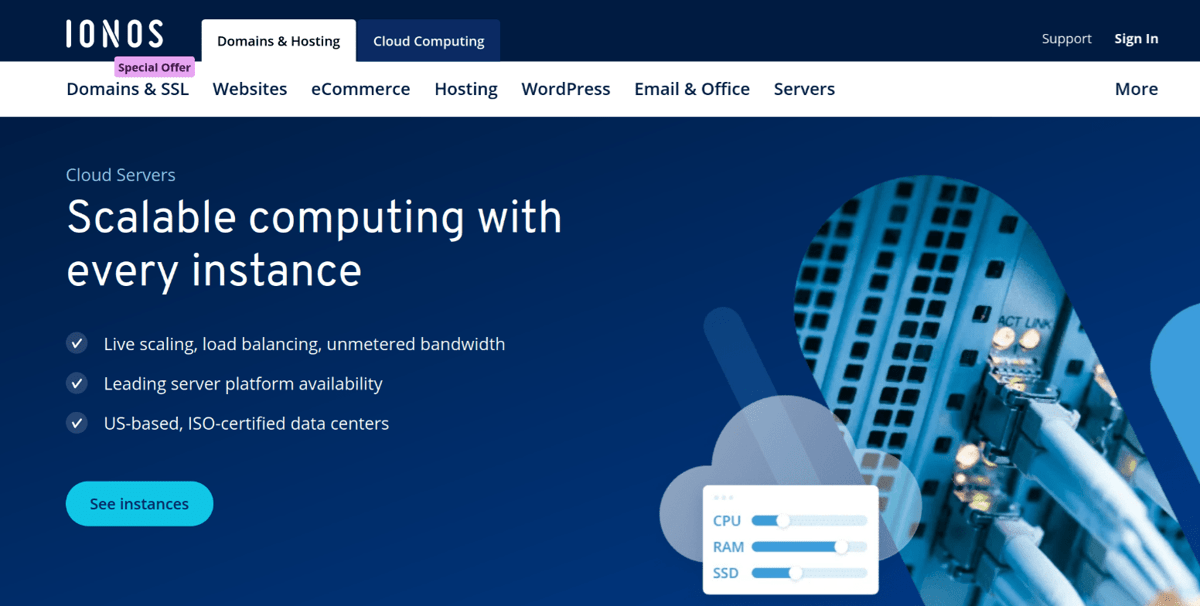
IONOS leverages Intel Xeon processors for their cloud hosting solutions. Their Cloud Server XS plan is competitively priced at $4 per month. It features 1 vCPU core, 512MB RAM and 30 GB SSD storage. Users also benefit from root access and unmetered bandwidth. The plan provides a 400 Mb/s external connection (egress) and a high-speed 10Gb/s internal connection (ingress) for fast data transfer rates. Find out more in our IONOS review.
What are the pros and cons of IONOS’s fast cloud hosting?
Pros
- PAYG (pay by the minute) billing
- Root access provided
- Free wildcard SSL
- 5 data center locations worldwide
- 99.99% uptime guarantee
Cons
- No free backups (paid feature)
- No free domain name provided
- Can’t load own OS
- No money back guarantee
What is fast VPS hosting?
Fast VPS hosting is a VPS (Virtual Private Server) solution that provides a global server response time of 180 ms or lower. VPS hosting is a type of hosting that uses virtualization technology to partition one single physical server into several virtual servers. Each virtual server goes to a separate user and operates independently, with its own operating system, resources, and configurations.
Fast VPS hosting is therefore a branch of VPS hosting that specifically focuses on delivering high-speed server responses to ensure quicker website load times and improved user experience. These factors are crucial for websites with high traffic volumes or those that require rapid data processing.
What is fast cloud hosting?
Fast cloud hosting is a cloud hosting solution with a global server response time of 180 ms or lower. Cloud hosting is a model where hosting services are provided by multiple virtualized servers. These servers work together to distribute resources and balance loads. This results in greater reliability and scalability compared to traditional single-server hosting. The setup of cloud hosting also allows users to scale resources up or down in real time. Fast cloud hosting is therefore recommended for websites and applications with fluctuating traffic and a need for speed.
How similar are fast VPS hosting and fast cloud hosting?
Fast VPS hosting and fast cloud hosting are similar in two fundamental ways: their use of virtualization and resource isolation. Firstly, both use virtualization technology called hypervisors. A VPS uses this to create multiple, separate virtual servers from a single physical server. In contrast, cloud hosting employs virtualization across a network of multiple physical servers.
Secondly, they both isolate server resources for each instance. In both VPS and cloud hosting, each virtual server operates independently with its own dedicated resources such as CPU, RAM, and storage. This isolation ensures that the performance of one server does not impact the others. Both products are collectively referred to as “VPS” due to these technical similarities, although they have distinct operational models and scalability features.
What differs fast VPS hosting from fast cloud hosting?
Fast VPS hosting differs from fast cloud hosting primarily in terms of how server resources are provisioned. Fast VPS hosting provisions resources from a single physical server. This means the total resources available to a VPS are limited to what that single physical server can offer. In contrast, fast cloud hosting provisions resources from multiple physical servers. This configuration allows the total resources available to be the cumulative capability of all the physical servers owned by the provider. This fundamental difference means cloud hosting offers greater scalability, reliability, and performance potential out of the two hosting types.
Should I start with VPS or cloud hosting?
You should start with VPS hosting if your website’s traffic is expected to grow steadily, such as with blogs or informational sites. This option is also ideal if you have a limited budget. VPS hosting offers fixed resources at predictable costs, which makes financial planning more straightforward. You also have the flexibility to switch to cloud hosting later as your needs evolve.
You should consider starting with cloud hosting if your website is likely to experience rapid fluctuations in traffic. This is common for eCommerce sites, SaaS platforms, or other online services where traffic can surge suddenly during certain sales periods during the year. Cloud hosting is more flexible in handling these spikes, but it’s important to have a budget that can accommodate potential increases in costs. This hosting model commonly follows a pay-as-you-go pricing structure, which means cost per month will vary based on resource usage.
When do I switch from VPS to cloud hosting?
Switch from VPS to cloud hosting when your website traffic becomes unpredictable and frequently exceeds your VPS resource limits. VPS hosting suits stable traffic patterns, but significant surges in demand undermine website performance. Slow server response times and frequent downtime are 2 signs that your VPS plan is insufficient. Use a host tracker like UptimeRobot, Pingdom, GTmetrix, or Bitcatcha Host Tracker to monitor key performance metrics and determine whether it’s time to upgrade from VPS to cloud hosting.
What makes a fast VPS hosting?
A fast VPS hosting service is equipped with speed-enhancing hardware and features that improves the performance of the hosted websites or applications. This includes top-end processors (e.g. Intel Xeon Scalable, AMD EPYC), and SSD or NVMe SSD storage. Outgoing bandwidth (egress bandwidth) in the range of 300 Mb/s to 1 Gb/s is also crucial. Being powered by the KVM virtualization module is another advantageous feature. Overall, fast VPS hosting provides the advantages of fast web hosting and adds on the benefits of a VPS server setup.
What slows down fast VPS?
A fast VPS is slowed down by 3 scenarios:
The first scenario is server resource overutilization. This occurs when the allocated resources like CPU, RAM, and storage are consistently maxed out due to increased website traffic or higher application usage. It results in slow response times or even server crashes.
The second scenario is hardware failure. VPS hosting relies on a single physical server, so all the virtual servers hosted on it are affected if any component (hard drive, power supply, motherboard) of the server fails. This leads to significant downtime and performance issues until the faulty hardware is fixed or replaced.
The third scenario is limited scalability. The resources available in a VPS are confined to the capacity of the single physical server it resides on. You face scalability challenges once your needs exceed these limits. This limitation is particularly problematic during sudden spikes in demand since you cannot dynamically increase resources with a VPS.
How can I speed up fast VPS hosting?
There are 3 ways to speed up fast VPS hosting: vertical scaling, utilizing root access, and picking the right data center location.
How does vertical scaling speed up VPS?
Vertical scaling, also known as “scaling up,” speeds up VPS by upgrading its existing resources. This process increases the capacity of the server by adding more virtual CPU (vCPU) cores, additional RAM, and expanding storage space. You can handle more traffic and process data more efficiently simply by increasing the capacity of your server.
However, it’s important to note that if your VPS is not already utilizing its full resource capacity, simply adding more resources will not lead to a performance improvement. Vertical scaling is most effective when your current resource usage is at or near its limits.
How does root access speed up VPS?
Root access speeds up VPS by providing the highest level of administrative control. This allows users to optimize their server’s environment and settings accordingly. This means enabling regular updates to the operating system, which ensures that the server runs the latest, most efficient version for improved performance, security, and stability. Root access also allows precise configuration of the web server settings, such as optimizing worker processes and managing memory usage for maximum efficiency.
How does data center location speed up VPS?
Data center location speeds up VPS hosting by reducing the physical distance the data has to travel between the server and the end-user. Data center location refers to the physical place where the servers are housed. When these data centers are closer to your target audience, the time it takes for the data to travel over the internet (a.k.a. latency) is significantly reduced. This proximity ensures that your website or application loads faster for users. It’s therefore important to pick a data center location that is as close as possible to your main audience. Most VPS hosts will allow you to change your data center location for free or for a small fee.
What is the importance of KVM in fast VPS hosting?
KVM is important in fast VPS hosting as it effectively minimizes the noisy neighbor effect. The noisy neighbor effect occurs when users on the same server consume excessive resources, which leads to potential interference or resource contention between accounts.
KVM (Kernel-based Virtual Machine) is a specific type of virtualization technology that integrates directly into the Linux kernel, the core part of the operating system. The integration allows each VPS to operate almost as a separate physical server, and provides a more isolated environment compared to other virtualization technologies. This allows your VPS to remain stable and unaffected by the high resource usage of others. Providers like Hostinger and ScalaHosting use KVM in their VPS hosting.
What makes a fast Windows VPS hosting?
A fast Windows VPS hosting service runs on a Windows operating system and offers a global server response time of 180 milliseconds or lower. Windows VPS hosting is a type of hosting that caters specifically to Windows-based applications. It offers an environment that supports Windows-specific software (e.g. Microsoft SQL Server, ASP.NET, Windows Server) and development tools (e.g.Internet Information Services (IIS), PowerShell, Visual Studio). Finding a fast Windows VPS host is ideal for users and businesses that rely on the Windows ecosystem and require high-speed server performance. Check our hosting for our brand recommendations.
Which is the best fast VPS hosting?
The best fast VPS hosting combines excellent server response times, consistent performance, and robust hardware to create an optimal environment for resource-intensive websites and applications.
Here’s a recap of our top brands:
| Specifications | Hostinger | TMDHosting | UltaHost | GreenGeeks | ScalaHosting | A2 Hosting | DreamHost |
|---|---|---|---|---|---|---|---|
| Plan name | KVM 2 | Starter | Basic | MVM-2GB | Build #1 | Supersonic 8 | VPS Business |
| vCPU/cores | 2 | 2 | 1 | 4 | 2 | 6 | 1 |
| RAM | 8 GB | 2 GB | 1 GB | 2 GB | 4 GB | 8 GB | 2 GB |
| Storage | 100 GB NVMe SSD | 60 GB SSD | 30 GB NVMe SSD | 50 GB SSD | 50 GB NVMe SSD | 200 GB NVMe SSD | 60 GB SSD |
| Bandwidth | 2 TB | 2 TB | Unlimited | 10 TB | Unmetered | 4 TB | Unlimited |
| Root access | Yes | No | Yes | Yes | Yes | Yes | No |
| Operating system (OS) | Linux: Ubuntu, Debian, Rocky Linux, CentOS, AlmaLinux | Linux: AlmaLinux only; Windows | Linux: AlmaLinux, CentOS, Debian, RockyLinux, Kali Linux; Windows | Linux: AlmaLinux only | Linux: AlmaLinux, CentOS, Debian, openSUSE, Rocky Linux, Ubuntu; Windows | Linux: CentOS, Debian, Ubuntu, AlmaLinux | Linux: Ubuntu only |
| Load own OS | No | No | cPanel, Plesk, Hestia,CyberPanel | No | No | No | Yes |
| Starting price /mo | $7.99 | $24.99 | $4.80 | $39.95 | $29.95 | $24.99 | $20.00 |
| See all features |
Hostinger is our #1 recommendation for fast VPS hosting.



